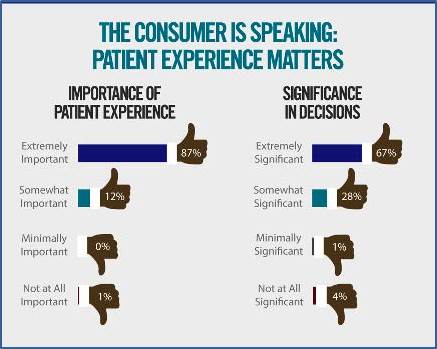
I’d like to start with a basic premise to consider in healthcare (and relevant to life in general, for that matter); that we have a series of experiences, driven by encounters with people or now even technology. These experiences are not just passing moments, but as defined, experiences are all that is perceived, understood and most importantly remembered. In asking the question, can you remember a healthcare experience that was outstanding or one that was dismal, undoubtedly all hands are raised. Some even stretch high with great emphasis. You see these are moments that shape who we are, leave lasting fragments in our memories and drive the very choices we make and stories we share as we move forward.

Wolf, Jason A. PhD (2015) “The State of Patient Experience 2015: A global perspective on the patient experience movement,” The Beryl Institute
Link: http://www.theberylinstitute.org/?page=PXBENCHMARKING
The Breadth of All Encounters
I encourage organizations looking at the concept of experience in healthcare – patient experience as the common vernacular – that we remember we are not simply talking about moments of satisfaction or service, but truly the breadth of all encounters one can and will have across a vast continuum of touch points. If we can agree then, that experience is something that will happen whether we plan for it or not, why would any healthcare organization or facility leave such a critical element to chance?
Growing Understanding and Engagement
The good news is that in increasing numbers, these organizations are realizing the breadth of what patient experience encompasses and taking intentional and conscious action. In fact, experience remains the top priority in healthcare especially if we look at it from the perspective of encompassing quality, safety and service elements of care, and even cost and broader population health influences.
From that, the story even grows more positive. In providing the best in experience for those in the healthcare system, there is an increasing shift to engaging the voices of those in its midst. In our latest global research on The State of Patient Experience, we found the fastest growing metric for experience excellence was the direct voices of patients and family members – either via advisory committees, real- time feedback or focus groups. More so, we discovered that one of the top three areas of investment globally to impact experience improvement was through more intentional patient and family engagement.
Leave Nothing to Chance
This is particularly interesting, not just because of the host site for this blog, but more so for what I suggested earlier -that if we believe experience takes place regardless of what we do, then in healthcare we cannot and must not leave it to chance. The greatest indication that organizations are heeding this word is found in the very data that shows the voices of those we care for and serve in healthcare are being sought and listened to in ways they never have before.
And while some may still resist this idea of partnership in the traditionally paternalistic and expert environment of healthcare, I would offer an alternative perspective. The strength in healthcare today will be the ability to balance expert knowledge, with engaging and inclusive partnership and a willingness to understand the customer is not always right (especially in healthcare), but they still deserve to be heard and engaged with dignity and respect. If we do this well, then the outcomes we look to achieve in healthcare are achievable in unimaginable ways. In fact, our research showed that people globally and across the healthcare continuum identified clinical outcomes by far as most impacted by strong and positive experience efforts.
A Foundation for Excellence
If you can accept then that patient experience matters, and requires that we build strong, vibrant, and engaged organizations, cognizant of who they serve, you then have a foundation for even more significant and comprehensive efforts. In our work at The Beryl Institute in involving the voices of thousands of individuals and organizations around the world, we have seen a common set of ideas emerge, which we offer as guiding principles for experience excellence. They include:
- Identify and support accountable leadership with committed time and focused intent to shape and guide experience strategy
- Establish and reinforce a strong, vibrant and positive organizational culture and all it comprises
- Develop a formal definition for what experience is to their organization
- Implement a defined process for continuous patient and family input and engagement
- Engage all voices in driving comprehensive, systemic and lasting solutions
- Look beyond clinical experience of care to all interactions and touch points
- Focus on alignment across all segments of the continuum and the spaces in between
- Encompass both a focus on healing and a commitment to well-being
Seizing the Moment
As we began, I offered a simple idea that experiences happen. They are happening at this very moment in your own organization and they may very well leave a lasting and lifetime impression and have far reaching effects, whether positive or not. Focusing then with intention on experience is not just a nice thing to consider; it must be an effort from which we do not stray. In healthcare we have a noble calling to help those in need, support well-being, heal or if we cannot, provide an environment of care, dignity and peace. I believe the results have always shown that patient experience matters. We now finally have the critical understanding, commitment and support to ensure it does. We must not let the opportunity pass.




